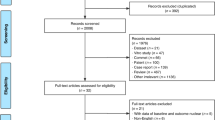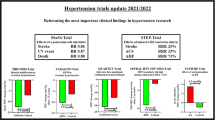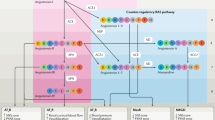Abstract
After an early report that patients treated with angiotensin-converting enzyme (ACE) inhibitors had a lower than expected incidence of cancers, there was a large number of publications investigating the possible pathophysiological mechanism mediating this effect, as well as population studies comparing the incidence of cancers in patients treated with agents inhibiting the renin–angiotensin system with their incidence in the general population. Several mechanisms are proposed to explain a potential anti-tumour activity of such agents in vitro in experimental animal models. However, the population studies are mostly inconclusive, although they do suggest a possible interaction between ACE genotypes and susceptibility to altered behaviour of certain tumours.
This is a preview of subscription content, access via your institution
Access options
Subscribe to this journal
Receive 12 digital issues and online access to articles
$119.00 per year
only $9.92 per issue
Buy this article
- Purchase on Springer Link
- Instant access to full article PDF
Prices may be subject to local taxes which are calculated during checkout

Similar content being viewed by others
References
Lever AF, Hole DJ, Gillis CR, McCallum IR, McInnes GT, MacKinnon PL et al. Do inhibitors of angiotensin-I-converting enzyme protect against risk of cancer? Lancet 1998; 352: 179–184.
Deshayes F, Nahmias C . Angiotensin receptors: a new role in cancer? Trends Endocrinol Metab 2005; 16: 293–299.
Folkman J, Watson K, Ingber D, Hanahan D . Induction of angiogenesis during the transition from hyperplasia to neoplasia. Nature 1989; 339: 58–61.
Escobar E, Rodriguez-Reyna TS, Arrieta O, Sotelo J . Angiotensin II, cell proliferation and angiogenesis regulator: biologic and therapeutic implications in cancer. Curr Vasc Pharmacol 2004; 2: 385–399.
Sugimoto M, Furuta T, Shirai N, Ikuma M, Sugimura H, Hishida A . Influences of chymase and angiotensin I-converting enzyme gene polymorphisms on gastric cancer risks in Japan. Cancer Epidemiol Biomarkers Prev 2006; 15: 1929–1934.
Molteni A, Ward WF, Ts’ao CH, Taylor J, Small Jr W, Brizio-Molteni L et al. Cytostatic properties of some angiotensin I converting enzyme inhibitors and of angiotensin II type I receptor antagonists. Curr Pharm Des 2003; 9: 751–761.
Ignjacev-Lazich I, Kintsurashvili E, Johns C, Vitseva O, Duka A, Shenouda S et al. Angiotensin-converting enzyme regulates bradykinin receptor gene expression. Am J Physiol Heart Circ Physiol 2005; 289: H1814–H1820.
Lindberg H, Nielsen D, Jensen BV, Eriksen J, Skovsgaard T . Angiotensin converting enzyme inhibitors for cancer treatment? Acta Oncol 2004; 43: 142–152.
Castellon R, Hamdi HK . Demystifying the ACE polymorphism: from genetics to biology. Curr Pharm Des 2007; 13: 1191–1198.
Tahmasebi M, Barker S, Puddefoot JR, Vinson JP . Localisation of renin-angiotensin system (RAS) components in breast. Br J Cancer 2006; 95: 67–74.
De Paepe B, Verstraeten VL, De Potter CR, Vakaet LA, Bullock GR . Growth stimulatory angiotensin II type-1 receptor is upregulated in breast hyperplasia and in situ carcinoma but not in invasive carcinoma. Histochem Cell Biol 2001; 116: 247–254.
De Paepe B, Verstraeten VM, De Potter CR, Bullock GR . Increased angiotensin II type-2 receptor density in hyperplasia, DCIS and invasive carcinoma of the breast is paralleled with increased iNOS expression. Histochem Cell Biol 2002; 117: 13–19.
Herr D, Rodewald M, Fraser HM, Hack G, Konrad R, Kreienberg R et al. Potential role of renin-angiotensin-system for tumor angiogenesis in receptor negative breast cancer. Gynecol Oncol 2008; 109: 418–425.
Small Jr W, Molteni A, Kim YT, Taylor JM, Chen Z, Ward WF . Captopril modulates hormone receptor concentration and inhibits proliferation of human mammary ductal carcinoma cells in culture. Breast Cancer Res Treat 1997; 44: 217–224.
Chochieva AR, Bolieva LZ, Dzhioev FK . New approaches to the drug prophylaxis of mammary tumor: evaluation of the prophylactic effect of lovastatin and captopril in rats with experimental mammary gland tumors. Eksp Klin Farmakol 2008; 71: 43–45 (in Russian).
Isobe A, Takeda T, Sakata M, Miyake A, Yamamoto T, Minekawa R et al. Dual repressive effect of angiotensin II-type 1 receptor blocker telmisartan on angiotensin II-induced and estradiol-induced uterine leiomyoma cell proliferation. Hum Reprod 2008; 23: 440–446.
Suganuma T, Ino K, Shibata K, Kajiyama H, Nagasaka T, Mizutani S et al. Functional expression of the angiotensin II type 1 receptor in human ovarian carcinoma cells and its blockade therapy resulting in suppression of tumor invasion, angiogenesis, and peritoneal dissemination. Clin Cancer Res 2005; 11: 2686–2694.
Ishiguro H, Ishiguro Y, Kubota Y, Uemura H . Regulation of prostate cancer cell growth and PSA expression by angiotensin II receptor blocker with peroxisome proliferator-activated receptor gamma ligand like action. Prostate 2007; 67: 924–932.
Uemura H, Ishiguro H, Kubota Y . Pharmacology and new perspectives of angiotensin II receptor blocker in prostate cancer treatment. Int J Urol 2008; 15: 19–26.
Uemura H, Hasumi H, Ishiguro H, Teranishi J, Miyoshi Y, Kubota Y . Renin-angiotensin system is an important factor in hormone refractory prostate cancer. Prostate 2006; 66: 822–830.
Volpert OV, Ward WF, Lingen MW, Chesler L, Solt DB, Johnson MD et al. Captopril inhibits angiogenesis and slows the growth of experimental tumors in rats. J Clin Invest 1996; 98: 671–679.
Yoshiji H, Yoshii J, Ikenaka Y, Noguchi R, Tsujinoue H, Nakatani T et al. Inhibition of renin-angiotensin system attenuates liver enzyme-altered preneoplastic lesions and fibrosis development in rats. J Hepatol 2002; 37: 22–30.
Yoshiji H, Kuriyama S, Kawata M, Yoshii J, Ikenaka Y, Noguchi R et al. The angiotensin-I-converting enzyme inhibitor perindopril suppresses tumor growth and angiogenesis: possible role of the vascular endothelial growth factor. Clin Cancer Res 2001; 7: 1073–1078.
Yoshiji H, Yoshii J, Ikenaka Y, Noguchi R, Yanase K, Tsujinoue H et al. Suppression of the renin-angiotensin system attenuates vascular endothelial growth factor-mediated tumor development and angiogenesis in murine hepatocellular carcinoma cells. Int J Oncol 2002; 20: 1227–1231.
Yoshiji H, Kuriyama S, Fukui H . Angiotensin-I-converting enzyme inhibitors may be an alternative anti-angiogenic strategy in the treatment of liver fibrosis and hepatocellular carcinoma. Possible role of vascular endothelial growth factor. Tumour Biol 2002; 23: 348–356.
Yoshiji H, Kuriyama S, Noguchi R, Fukui H . Angiotensin-I converting enzyme inhibitors as potential anti-angiogenic agents for cancer therapy. Curr Cancer Drug Targets 2004; 4: 555–567.
Noguchi R, Yoshiji H, Kuriyama S, Yoshii J, Ikenaka Y, Yanase K et al. Combination of interferon-beta and the angiotensin-converting enzyme inhibitor, perindopril, attenuates murine hepatocellular carcinoma development and angiogenesis. Clin Cancer Res 2003; 9 (16 Part 1): 6038–6045.
Yanase K, Yoshiji H, Ikenaka Y, Noguchi R, Kitade M, Kaji K et al. Synergistic inhibition of hepatocellular carcinoma growth and hepatocarcinogenesis by combination of 5-fluorouracil and angiotensin-converting enzyme inhibitor via anti-angiogenic activities. Oncol Rep 2007; 17: 441–446.
Yoshiji H, Kuriyama S, Noguchi R, Yoshii J, Ikenaka Y, Yanase K et al. Amelioration of carcinogenesis and tumor growth in the rat liver by combination of vitamin K2 and angiotensin-converting enzyme inhibitor via anti-angiogenic activities. Oncol Rep 2006; 15: 155–159.
Yoshiji H, Noguchi R, Yamazaki M, Ikenaka Y, Sawai M, Ishikawa M et al. Combined treatment of vitamin K2 and angiotensin-converting enzyme inhibitor ameliorates hepatic dysplastic nodule in a patient with liver cirrhosis. World J Gastroenterol 2007; 13: 3259–3261.
Hii SI, Nicol DL, Gotley DC, Thompson LC, Green MK, Jonsson JR . Captopril inhibits tumour growth in a xenograft model of human renal cell carcinoma. Br J Cancer 1998; 77: 880–883.
Miyajima A, Kosaka T, Asano T, Asano T, Seta K, Kawai T et al. Angiotensin II type I antagonist prevents pulmonary metastasis of murine renal cancer by inhibiting tumor angiogenesis. Cancer Res 2002; 62: 4176–4179.
Reddy MK, Baskaran K, Molteni A . Inhibitors of angiotensin-converting enzyme modulate mitosis and gene expression in pancreatic cancer cells. Proc Soc Exp Biol Med 1995; 210: 221–226.
Ohta T, Amaya K, Yi S, Kitagawa H, Kayahara M, Ninomiya I et al. Angiotensin converting enzyme-independent, local angiotensin II-generation in human pancreatic ductal cancer tissues. Int J Oncol 2003; 23: 593–598.
Arafat HA, Gong Q, Chipitsyna G, Rizvi A, Saa CT, Yeo CJ . Antihypertensives as novel antineoplastics: angiotensin-I-converting enzyme inhibitors and angiotensin II type 1 receptor blockers in pancreatic ductal adenocarcinoma. J Am Coll Surg 2007; 204: 996–1005.
Kucerova D, Zelezna B, Sloncova E, Sovova V . Angiotensin II receptors on colorectal carcinoma cells. Int J Mol Med 1998; 2: 593–595.
Takagi T, Nakano Y, Takekoshi S, Inagami T, Tamura M . Hemizygous mice for the angiotensin II type 2 receptor gene have attenuated susceptibility to azoxymethane-induced colon tumorigenesis. Carcinogenesis 2002; 23: 1235–1241.
Attoub S, Gaben AM, AL-Salam S, Al Sultan MA, John A, Nicholls MG et al. Captopril as a potential inhibitor of lung tumor growth and metastasis. Ann NY Acad Sci 2008; 1138: 65–72.
Kowalski J, Belowski D, Madej A, Herman ZS . Effects of thiorphan, bestatin and captopril on the Lewis lung carcinoma metastases in mice. Pol J Pharmacol 1995; 47: 423–427.
Prontera C, Mariani B, Rossi C, Poggi A, Rotilio D . Inhibition of gelatinase A (MMP-2) by batimastat and captopril reduces tumor growth and lung metastases in mice bearing Lewis lung carcinoma. Int J Cancer 1999; 81: 761–766.
Kowalski J, Herman ZS . Captopril augments antitumor activity of cyclophosphamide in mice. Pol J Pharmacol 1996; 48: 281–285.
Egami K, Murohara T, Shimada T, Sasaki K, Shintani S, Sugaya T et al. Role of host angiotensin II type 1 receptor in tumor angiogenesis and growth. J Clin Invest 2003; 112: 67–75.
de Groot-Besseling RR, Ruers TJ, van Kraats A, Poelen GJ, Ruiter DJ, de Waal RM et al. Anti-tumor activity of a combination of plasminogen activator and captopril in a human melanoma xenograft model. Int J Cancer 2004; 112: 329–334.
Juillerat-Jeanneret L, Celerier J, Chapuis Bernasconi C, Nguyen G, Wostl W, Maerki HP et al. Renin and angiotensinogen expression and functions in growth and apoptosis of human glioblastoma. Br J Cancer 2004; 90: 1059–1068.
Fogarty DJ, Sánchez-Gómez MV, Matute C . Multiple angiotensin receptor subtypes in normal and tumor astrocytes in vitro. Glia 2002; 39: 304–313.
Nakagawa T, Kubota T, Kabuto M, Kodera T . Captopril inhibits glioma cell invasion in vitro: involvement of matrix metalloproteinases. Anticancer Res 1995; 15 (5B): 1985–1989.
Arrieta O, Guevara P, Escobar E, García-Navarrete R, Pineda B, Sotelo J . Blockage of angiotensin II type I receptor decreases the synthesis of growth factors and induces apoptosis in C6 cultured cells and C6 rat glioma. Br J Cancer 2005; 92: 1247–1252.
Chen L, Re RN, Prakash O, Mondal D . Angiotensin-converting enzyme inhibition reduces neuroblastoma cell growth rate. Proc Soc Exp Biol Med 1991; 196: 280–283.
Fujita M, Hayashi I, Yamashina S, Itoman M, Majima M . Blockade of angiotensin AT1a receptor signaling reduces tumor growth, angiogenesis, and metastasis. Biochem Biophys Res Commun 2002; 294: 441–447.
Fujita M, Hayashi I, Yamashina S, Fukamizu A, Itoman M, Majima M . Angiotensin type 1a receptor signaling-dependent induction of vascular endothelial growth factor in stroma is relevant to tumor-associated angiogenesis and tumor growth. Carcinogenesis 2005; 26: 271–279.
Ward WF, Molteni A, Ts’ao C, Hinz JM . The effect of Captopril on benign and malignant reactions in irradiated rat skin. Br J Radiol 1990; 63: 349–534.
Takeda H, Kondo S . Differences between squamous cell carcinoma and keratoacanthoma in angiotensin type-1 receptor expression. Am J Pathol 2001; 158: 1633–1637.
Takeda H, Katagata Y, Kondo S . Immunohistochemical study of angiotensin receptors in human anagen hair follicles and basal cell carcinoma. Br J Dermatol 2002; 147: 276–280.
Meier CR, Derby LE, Jick SS, Jick H . Angiotensin-converting enzyme inhibitors, calcium channel blockers, and breast cancer. Arch Intern Med 2000; 160: 349–353.
Stahl M, Bulpitt CJ, Palmer AJ, Beevers DG, Coles EC, Webster J . Calcium channel blockers, ACE inhibitors, and the risk of cancer in hypertensive patients: a report from the Department of Human Health Hypertension Care Computing Project (DHCCP). J Hum Hypertens 2000; 14: 299–304.
Friis S, Sørensen HT, Mellemkjaer L, McLaughlin JK, Nielsen GL, Blot WJ et al. Angiotensin-converting enzyme inhibitors and the risk of cancer: a population-based cohort study in Denmark. Cancer 2001; 92: 2462–2470.
Lindholm LH, Anderson H, Ekbom T, Hansson L, Lanke J, Dahlöf B et al. Relation between drug treatment and cancer in hypertensives in the Swedish Trial in Old Patients with Hypertension 2: a 5-year, prospective, randomised, controlled trial. Lancet 2001; 358: 539–544.
Li CI, Malone KE, Weiss NS, Boudreau DM, Cushing-Haugen KL, Daling JR . Relation between use of antihypertensive medications and risk of breast carcinoma among women ages 65–79 years. Cancer 2003; 98: 1504–1513.
van der Knaap R, Siemes C, Coebergh JW, van Duijn CM, Hofman A, Stricker BH . Renin-angiotensin system inhibitors, angiotensin I-converting enzyme gene insertion/deletion polymorphism, and cancer: the Rotterdam Study. Cancer 2008; 112: 748–757.
Koh WP, Yuan JM, Sun CL, van den Berg D, Seow A, Lee HP et al. Angiotensin I-converting enzyme (ACE) gene polymorphism and breast cancer risk among Chinese women in Singapore. Cancer Res 2003; 63: 573–578.
Koh WP, Yuan JM, van den Berg D, Lee HP, Yu MC . Polymorphisms in angiotensin II type 1 receptor and angiotensin I-converting enzyme genes and breast cancer risk among Chinese women in Singapore. Carcinogenesis 2005; 26: 459–464.
González-Zuloeta Ladd AM, Arias Vásquez A, Sayed-Tabatabaei FA, Coebergh JW, Hofman A, Njajou O et al. Angiotensin-converting enzyme gene insertion/deletion polymorphism and breast cancer risk. Cancer Epidemiol Biomarkers Prev 2005; 14: 2143–2146.
Yaren A, Turgut S, Kursunluoglu R, Oztop I, Turgut G, Degirmencioglu S et al. Insertion/deletion polymorphism of the angiotensin I-converting enzyme gene in patients with breast cancer and effects on prognostic factors. J Investig Med 2007; 55: 255–261.
Kikkawa F, Mizuno M, Shibata K, Kajiyama H, Morita T, Ino K et al. Activation of invasiveness of cervical carcinoma cells by angiotensin II. Am J Obstet Gynecol 2004; 190: 1258–1263.
Freitas-Silva M, Pereira D, Coelho C, Bicho M, Lopes C, Medeiros R . Angiotensin I-converting enzyme gene insertion/deletion polymorphism and endometrial human cancer in normotensive and hypertensive women. Cancer Genet Cytogenet 2004; 155: 42–46.
Hsieh YY, Lee CC, Chang CC, Wang YK, Yeh LS, Lin CS . Angiotensin I-converting enzyme insertion-related genotypes and allele are associated with higher susceptibility of endometriosis and leiomyoma. Mol Reprod Dev 2007; 74: 808–814.
Ronquist G, Rodriguez LA, Ruigómez A, Johansson S, Wallander MA, Frithz G et al. Association between captopril, other antihypertensive drugs and risk of prostate cancer. Prostate 2004; 58: 50–56.
Medeiros R, Vasconcelos A, Costa S, Pinto D, Lobo F, Morais A et al. Linkage of angiotensin I-converting enzyme gene insertion/deletion polymorphism to the progression of human prostate cancer. J Pathol 2004; 202: 330–335.
Yigit B, Bozkurt N, Narter F, Yilmaz H, Yucebas E, Isbir T . Effects of ACE I/D polymorphism on prostate cancer risk, tumor grade and metastasis. Anticancer Res 2007; 27: 933–936.
Sjöberg T, Garcia Rodriguez LA, Lindblad M . Angiotensin-converting enzyme inhibitors and risk of esophageal and gastric cancer: a nested case-control study. Clin Gastroenterol Hepatol 2007; 5: 1160–1166.e1.
Khurana V, Kyanam K, Caldito G . Angiotensin converting enzyme inhibitors reduce the incidence of esophageal cancer: a study of half a million US veterans. Gastroenterology 2006; 130, Issue 4, Supplement 2, M 2098 A 413.
Khurana V, Sheth A, Caldito G, Barkin JS . Angiotensin converting enzyme inhibitors reduce the incidence of pancreatic cancer: a study of half a million US veterans. Gastroenterology 2006; 130, Issue 4, Supplement 2, M 2163 A-425–426.
Khurana V, Bejjanki HR, Caldito G . Angiotensin converting enzyme inhibitors reduce the incidence of colon cancer: a study of half a million US veterans. Gastroenterology 2006; 130, Issue 4, Supplement 2, S 1222 A 180.
Ebert MP, Lendeckel U, Westphal S, Dierkes J, Glas J, Folwaczny C et al. The angiotensin I-converting enzyme gene insertion/deletion polymorphism is linked to early gastric cancer. Cancer Epidemiol Biomarkers Prev 2005; 14: 2987–2989.
Goto Y, Ando T, Nishio K, Ishida Y, Kawai S, Goto H et al. The ACE gene polymorphism is associated with the incidence of gastric cancer among H. pylori seropositive subjects with atrophic gastritis. Asian Pac J Cancer Prev 2005; 6: 464–467.
Röcken C, Lendeckel U, Dierkes J, Westphal S, Carl-McGrath S, Peters B et al. The number of lymph node metastases in gastric cancer correlates with the angiotensin I-converting enzyme gene insertion/deletion polymorphism. Clin Cancer Res 2005; 11: 2526–2530.
Carl-McGrath S, Ebert MP, Lendeckel U, Röcken C . Expression of the local angiotensin II system in gastric cancer may facilitate lymphatic invasion and nodal spread. Cancer Biol Ther 2007; 6 (8): 1218–1226.
Neo JH, Malcontenti-Wilson C, Muralidharan V, Christophi C . Effect of ACE inhibitors and angiotensin II receptor antagonists in a mouse model of colorectal cancer liver metastases. J Gastroenterol Hepatol 2007; 22: 577–584.
Christian JB, Lapane KL, Hume AL, Eaton CB, Weinstock MA, VATTC Trial. Association of ACE inhibitors and angiotensin receptor blockers with keratinocyte cancer prevention in the randomized VATTC trial. J Natl Cancer Inst 2008; 100: 1223–1232.
Stanojkovic TP, Zizak Z, Mihailovic-Stanojevic N, Petrovic T, Juranic Z . Inhibition of proliferation on some neoplastic cell lines-act of carvedilol and captopril. J Exp Clin Cancer Res 2005; 24: 387–395.
Heffelfinger SC . The renin angiotensin system in the regulation of angiogenesis. Curr Pharm Des 2007; 13: 1215–1229.
Author information
Authors and Affiliations
Corresponding author
Rights and permissions
About this article
Cite this article
Rosenthal, T., Gavras, I. Angiotensin inhibition and malignancies: a review. J Hum Hypertens 23, 623–635 (2009). https://doi.org/10.1038/jhh.2009.21
Received:
Revised:
Accepted:
Published:
Issue Date:
DOI: https://doi.org/10.1038/jhh.2009.21
Keywords
This article is cited by
-
Prognosis of Midkine and AT1R expression in resectable head and neck squamous cell carcinoma
Cancer Cell International (2023)
-
Association between angiotensin-converting enzyme inhibitors and the risk of lung cancer: a systematic review and meta-analysis
British Journal of Cancer (2023)
-
The use of renin angiotensin aldosterone system inhibitors may be associated with decreased mortality after cancer surgery
Scientific Reports (2022)
-
Predicting tumor response to drugs based on gene-expression biomarkers of sensitivity learned from cancer cell lines
BMC Genomics (2021)
-
Cardiovascular medication use and risks of colon cancer recurrences and additional cancer events: a cohort study
BMC Cancer (2019)



